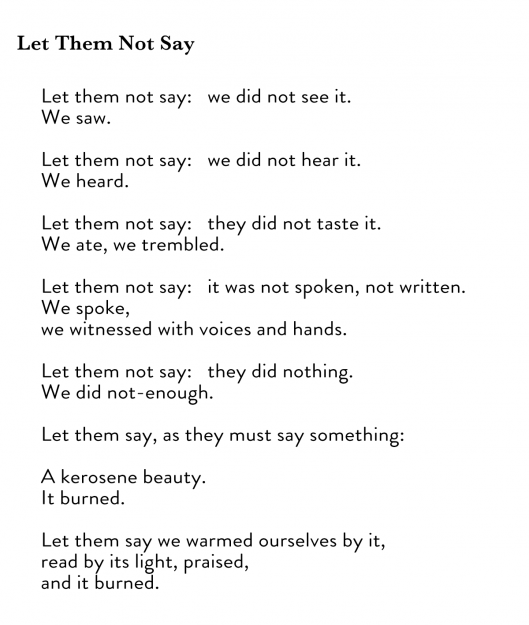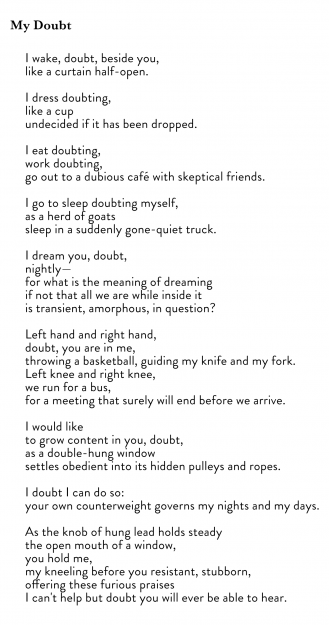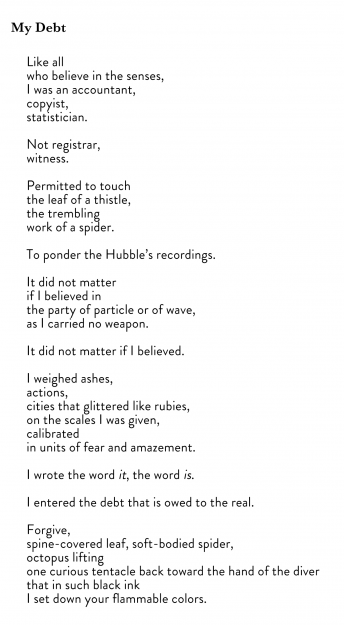The work of Buddhist poet Jane Hirshfield, adored by readers worldwide, tackles some of the biggest questions we face as living beings. Addressing ecological, scientific, political, metaphysical, and artistic concerns, her poetry and essays move between scales vast and minuscule, balancing awe and mundanity, the out of the ordinary and the everyday. Her nine books of poetry include The Beauty; Given Sugar, Given Salt; and After. She’s also written two collections of essays: Nine Gates: Entering the Mind of Poetry and Ten Windows: How Great Poems Transform the World.
Her latest book of poetry, Ledger (Knopf, March 10, 2020), looks carefully at the environmental crisis, both mourning and praising “our cataloged vanishing unfinished heaven.” I read the book after visiting Chicago’s Field Museum of Natural History and spending hours in an exhibition called “Evolving Planet,” which tracks the 4.6-billion-year history of the Earth and its life forms. This unfathomably long (“beyond measure,” in Hirshfield’s words) and unlikely chain of events—from the formation of the planet to the emergence of single-celled life, onwards to lichens and plants, sea creatures, and land-animals—that led to us today, at this particular moment, is astonishing to behold. And in many ways, Ledger excavates some of this inevitable yet surprising history.
I had the opportunity to speak with Hirshfield about her latest collection, and how she approaches life’s elusive questions on scales both grand and small.
***
Can you tell me a little bit about how you came to write this particular book? How did writing it differ from your experience with your previous collection, The Beauty (Knopf, 2015)?
These have been sea-change years. Ledger’s opening poem, “Let Them Not Say,” was written in 2014 with the environmental crisis in mind. It was first published on January 17, 2017, the day of the presidential inauguration, to enormous response. Times had changed and broadened its meaning. The book’s final poems were written as the climate crisis, which I’ve written about for many years, became more fully visible. Social-justice themes also run throughout its pages. The bodhisattva vow has seeped into my pen’s ink. This isn’t particular to me. Most people I know feel this increase of urgency. The realities we see all around us require it. Even “sea-change” has taken on a new meaning.
During the years when I was writing Ledger, the crisis of the biosphere went from something imagined as future to something current, arrived. I waded in it for weeks, calf-deep, on the paths of a Florida Gulf Coast island, five feet above sea-level at its highest spine. The sheer and ground-slip of culture, the seeming failure of the social contract, shifted this book as well. Poems also emerged from the personal: one is about realizing how much I wanted to continue being surprised, another came from reading a library book thoroughly dog-eared by a prior patron, and some others came with a friend’s diagnosis and death from glioblastoma.

Species loss, environmental degradation, the disappearance of animals and atmospheres, aging, mortality—how does poetic practice affect your (and everyone’s) encounter with these forms of loss? What can a poem change?
For answerable questions, we have mathematics, science, engineering, all the immense machinery of care-taking that we humans have devised to keep ourselves fed, clothed, housed, cloaked in the folds of community and culture. Poetry—and spiritual teachings, philosophy, the other arts—are how we approach questions unanswerable in other ways.
I write to meet my life and the world’s lives fully, with my own eyes. The pupils widen further when they look for a new phrase, a new gesture. I need this impractical, unmeasurable, sometimes startling experience—need its capacity to make visible and audible the wholeness of heart that can be present even in fear, even in grief—to allow me to touch my life’s fabric. Poems also show us that we are not alone, not passive, not helpless, not without choice, whatever the circumstance. Even in the face of what seems unchangeable, by writing it down, we change it, and change ourselves. The literal meaning of the Greek poiesis is “making.” The writer R.P. Blackmur (1904–1965) said, “A good poem expands the available stock of reality.” It feels so to me. That breathing room and expansion let me go on.
Buddhist practice figures into this also. Can you speak to the role that Zen plays for you in excavating or facing these difficult things?
The practices of poetry, of Zen, and of daily life feel, for me, continuous. I bring to each the same hands, the same set of hopes and intentions: To know the world and not obstruct it. To sustain openness to what is. To bring forth in body, speech, and mind an original expression of the life and world and age I’ve been given to carry. To act with an awareness of interconnection. To lessen rather than add to suffering. To glimpse, a few times in my life, the full abundance of being and of beyond-being. To know existence directly, to live with these ears and eyes unconfined by the bell jar of narrow self. But also to treasure that small self, to care for it as we would care for any small, fragile being, any carpenter’s chisel, any washed bowl set carefully down.
The practice of zazen [meditation] awakens many things—among them, courage. Meditation trains courage, and it encourages. Zen’s formal practice has given me sustenance and tools—meditation, mindfulness, silence; certain stories and koans; the precepts and paramitas [perfections, or ideals]; the simple, helpful stubbornness of vow and intention. Also a basic stance of humility and non-grasping; keeping a don’t-know mind is one useful antidote to despair.
Has Buddhist practice sustained your response to these times of crisis in more concrete ways?
The night of the 2016 election, I asked myself what might be a right practice response to this unfathomable-to-me choice my fellow country-persons had made. The answer that came: “Do what you have been doing, only harder.” I’ve kept asking the question and thus far the answer has stayed the same. Part of that is continuing to honor interiority and non-doing, and to trust in the seemingly peripheral life of poem-writing as well as activism. Our culture values visible doing, but the heart also needs non-doing. Part of that is recognizing the perfection of things as they are, even now. Part is keeping the humility of a don’t-know mind. Part is bringing forward the values of kinship and shared fate, of compassion and interconnection. And part, too, has been a vow to take some daily action.
Action is equally an antidote to despair, and beginning with the day of the 2017 inauguration, my practice has included taking action each day—large or small—without weighing its practical outcome. [Former Czech President] Vaclav Havel’s sentence stays close: “Work for something because it is good, not just because it stands a chance to succeed.”

The “ledger” of the book’s title comes up in several poems, most notably the title poem, but also in the poem “My Dignity,” and in the imagery of “My Debt.” Can you speak to this sense of accounting and accountability?
In the face of catastrophe, one of the first things you do is stop, look around, take stock, weigh the changed conditions in which you now must go forward. A sense of reckoning—emotional, conceptual, and ethical—runs through this book’s pages. We who live in a time of “alternative facts” and unfounded assertions can already see the harvest of reality-evasion. Thirst for the actual is one reason the language of science has become more present in my life and my poems. Science’s fidelity to clear observation feels needed.
Justice is equally a type of actuality-accounting, one I’ve pondered from many sides in my poems all my life. We notice justice’s failures much more than its presence. When present, justice is invisible, a right balance that needs no poems. I wrote “Justice Without Passion” in 1986, in response to Robert Bork’s Supreme Court nomination, an early sign of much that has followed. Two of my poems from 2004, “To Judgment: An Assay” and “To Opinion: An Assay,” hold my discomfort with judging. Seng Ts’an [the third Zen patriarch] taught, “The Great Way is not difficult; only give up picking and choosing.” Yet keeping a practice-mind is not about being stupid, blind, unnuanced, unfeeling, or cruel. Discernment is needed.
The poems in Ledger reflect all these thoughts. Some—“Let Them Not Say” and “On the Fifth Day,” for example—have become anthems for activists. Others try simply to face and name things correctly, such as “Description” and “Ghazal for the End of Time.” Some hold the spirit of Avalokitesvara, the bodhisattva of compassion, who hears beings’ cries and comes.
A sense of abundance is, I think, indispensable to equality and justice. A person afraid of hunger, cold, or powerlessness will behave badly, defensively. Recognizing the abundance of existence invites us to answer in ways equally generous. Traditional Zen imagery may sometimes seem chilled, but it also conveys a sense of limitless treasure: from a withered branch, the flowers of the apricot blossom. Sunyata [emptiness] is a flowering, not a barren. And the same flowering of non-attachment to self or outcome underlies justice.
Transience, doubt, failure, grief, even a sense of waiting: these words come to mind when I try to describe this collection. One poem is titled, and celebrates, “My Doubt;” another question is contentment. Yet there’s also a sense of mystery and un-knowing, of possibility (“What word, what act, / was it we thought did not matter?”). How does the book address these two poles and move between them?
Your question beautifully captures the balancing act of my own psyche these past years. When I contemplate the future, it is hard to feel hopeful. But mystery and keeping a don’t-know mind remind me that I cannot know the future. The future will always surprise.
These many emotions are the music a life is conducted by and one way that we know the full dapple and opulence of existence. They are also the body and psyche’s weather, which comes and goes from sources too subtle to ever predict or understand completely. A world without weather would be narrow, boring, diminished. And so, in my poems, all the emotions, especially the difficult ones, are wanted, are welcomed. But when I found myself, these past years, leaning too hard toward darkness, I understood that such a view was incomplete. Despair does not help beings’ hearts or futures. And so, the last poem in the book, “My Debt,” was written with exactly this spirit of navigation. It attempts to correct something I came to realize was amiss late in writing the book: I had not praised enough, not thanked enough, the abundance of beings and beauties that are still here.

♦
Poems from Ledger by Jane Hirshfield © 2020. Reprinted with permission of Knopf (knopfdoubleday.com/imprint/knopf).